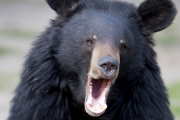I began to compose mentally a poem to my ex-wife:
Radishes are red
Bruises are blue;
You don’t like me
And I don’t like you.
But somehow it lacked the raw passion of Ms. Müller’s outburst.
I introduced the next reader. “Mr. Art Sieman finds inspiration for his poems in his job as a nocturnal companion to the inhabitants of the Blandsville Animal Inn. His first volume of poetry, The Triumphant Jabberwockey, published by Misprint Printers, includes his poem ‘Fauna’.”
Mice
Are not nice
And when a cat
Kills a rat
I am sat-
Isfied
It died
But a giraffe
Gives me a laugh
And a half
And I love
A dove,
But best is a human
Man or woman
Don or Donna
And I’m gonna
View them with a sensation
Of elation
As the pinnacle of creation.
The feminists clearly outnumbered the animal lovers as Mr. Sieman scored a 64.
“Our next contestant is Margaret Mouré. She teaches creative writing at Perdue Community College. She has published six volumes of verse with Gibberish Press, the latest of which is Sunset Sonnets.”
Ms. Mouré stood at the microphone. “Wisdom,” she announced. Then followed three minutes of silence. “Thank you,” she said. I imagined her collective works: blank pages with here and there a title. Silence is golden, however, and she edged Mr. Sieman with a score of 66.
“Our fourth reader, Peggy Page, lives in Blandsville, but her home is the world. She has published one volume, Ephemeral Eternities, with Kindergarten Printing, from which she will read ‘Pilgrimage to Delphi’.”
I crossed the ancient seas
To Greece
On a modern liner
Hoping the dead gods
Would resurrect themselves
Once more
To share their wisdom with me.
At Delphi I listened
For the hum or moan or whistle
Of great Apollo
Even though no oracle was there
To interpret for me
I wanted one sentence
One phrase one word
But only silence
I had come ignorant but hopeful
I left ignorant and disappointed.
Obviously puzzled, the audience clapped tentatively. 65.
“Our final poet, Bliss Lampman, is an artist who paints houses, inside and out. His books, with Pure Pornography Publishers, include The Iron Canoe and Hitchhiking on the Nile.” The thin, bespectacled Mr. Lampman read his poem, “The Thunderstorm” diffidently:
On a humid summer day
That is too stickily warmy,
A thunderstorm is on its way,
The raindrops like an army
To battle those big beads of sweat
That troop across my brow
And make my body ocean wet –
Oh, look! The storm’s here now!
Now my discomfort’s in retreat;
The thunder’s like artillery
The perspiration has been beat
With wind as an auxiliary.
Now nature’s won the weather war
Against heat and humidity
And I feel comfortable once more
With much lower liquidity.
The applause, much of it from nature-lovers, I presume, gave Mr. Lampman a 75.
I felt some relief now that the competition was over. We’d had rhymed verse, free verse, and in Ms. Mouré’s case, non-verse. Ms. Browning announced the results, then presented the winner, Ms. Müller, with her trophy. She also asked for a round of applause for me, but it was anemic because most people were hurrying to the back tables for food and coffee.
I got a coffee, then purchased one copy of each title on sale as a souvenir of the event.
Ms. Browning was surrounded by four poets, arguing vociferously. I felt sorry for her. When she finally escaped from the quartette of complainers, I said: “Well, it looks as if next year you’ll have to find a new system of judging,” stating the obvious. “Yes,” she said wearily. Mentally I began to compose another poem:
Radishes are red
Bruises are blue;
Poetry contests
Are sure tough on you.





